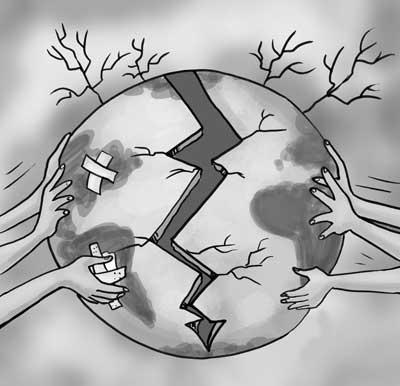Reply To:
Name - Reply Comment
Today, though it is better known as the American Independence Day with the Unites States facing its worst health and economic crisis in its history, is also the United Nations International Day of Co-operatives with the world body this year inviting the people to cooperate to fight for climate action.

Since the Second World War and especially the Ronald Reagan era when the US became the epicenter of the globalised capitalist market economic system, the world’s most powerful country—or should we say once the world’s most powerful country-- appears to be falling apart largely because of the dangerously inconsistent policies of president Donald Trump. For instance while most of the world’s top scientists are advising people to wear face masks and maintain physical distancing to help curb and combat the unprecedented Covid-19 pandemic, Mr. Trump is refusing to wear a mask and even refusing to advise his largely hardline white racist supporters to wear masks. Mr. Trump, widely regarded as a glorified cad and pathological liar, also still insists the climate change is a Chinese hoax. He has pulled the US out of the Paris treaty to battle climate change though almost all other countries have signed it and are taking proactive or high-tech
measures to implement it.
According to the UN, no country is immune from climate change. Greenhouse gas emissions are more than 50 percent higher than they were in 1990, and global warming is causing long-lasting changes to our climate system. It threatens irreversible consequences if we do not act. But most independent world analysts believe Mr. Trump will reject this just as he is rejecting expert scientific advice on the Covid-19 pandemic. That is why the analysts believe that if Mr. Trump is not defeated at the November 3 presidential election, not only the US but the whole world might be plunged into a dangerous political crisis or even a nuclear war.
Accordingly, the UN Cooperatives for Climate Action was chosen as this year’s theme to address climate crisis and to support sustainable development goal 13 on climate action.
Climate change severely impacts people’s livelihoods around the world, especially the most disadvantaged groups such as small-scale farmers, women, youth, indigenous people and ethnic minorities, who have to cope with extreme natural disasters and degradation of natural resources. This year the UN will focus on the contribution of cooperatives to combating climate change. The International Day of Cooperatives is an annual celebration of the cooperative movement. It has taken place on the first Saturday of July since 1923.
Since 1995, the UN and the International Cooperative Alliance have been setting the theme for the celebration of the Day. The aim is to increase awareness of cooperatives. The event underscores the contributions of the cooperative movement to resolving the major problems addressed by the UN and to strengthening and extending the partnerships between the international cooperative movement and other actors.
According to the UN and the International Cooperative Alliance, the earliest record of a cooperative comes from Fenwick in Scotland where, in March 14, 1761, in a barely furnished cottage, local weavers carried sacks of oatmeal into John Walker’s whitewashed front room and began selling the contents at a discount, forming the Fenwick Weavers’ Society. Co-operatives have been acknowledged as associations and enterprises through which citizens can effectively improve their lives while contributing to the economic, social, cultural and political advancement of their community and nation. The co-operative movement has been also recognised as a distinct and major stakeholder in both national and international affairs.
In Sri Lanka, after the SWRD Bandaranaike’s government took over in 1956, trade minister T.B. Illangaratne began and developed the co-operative movement. Most middle class and poor people were able to obtain rice and other essential commodities at affordable prices. This was done through a ration book and it helped millions of people.
But when the J.R. Jayewardene government took over in 1977, it virtually swallowed whole sale the globalised capitalist market economic system which was foisted upon the world by President Reagan and the then British Prime Minister Margaret Thatcher. We hope the Rajapaksa government will consider the renewal of the co-operative movement through which, as the UN says, citizens could improve their lives while contributing to the economic, social, cultural and political development of the country.